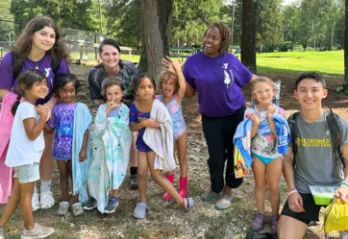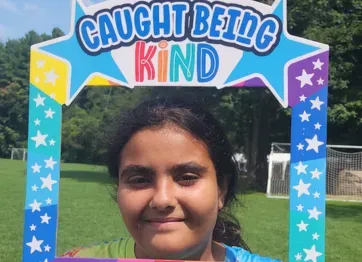How the MetroWest YMCA Summer Camp Fosters a Diverse, Inclusive Environment

Summer camp is where kids can make new friends, nurture their imaginations, and, most importantly, be themselves. To ensure all young people have this experience, MetroWest YMCA summer camps prioritize diversity and inclusion so that everyone – from campers and their families to staff members – feels welcome and supported.
Inclusivity opens the door to community, connection, and belonging as well as an opportunity to learn about the world and other people.
“We all bring something to the table, especially regarding our experiences with race, religion, or just being human,” says Laina Abolfazli, LCSW, Director of Inclusion at the MetroWest Y. In her role, Laina serves as a resource and finds creative ways to integrate children with different needs into the Y’s programming.
“The only way for our community to grow is to really look towards each other and listen to create an environment where it’s safe to be yourself and have open conversations,” Laina emphasizes.
The ability to listen helps provide a foundation to establishing that safe space. It’s how we begin to understand that we all have different needs; that it’s more about equity, giving everyone a chance to be successful based on individual needs, instead of equality, giving everybody the same thing to be successful.
Year-round efforts to ensure inclusivity at camp
At MetroWest Y summer camps, open communication among staff members and between staff and families is critical, allowing for honest conversations. Knowing the community and nurturing those relationships is also key.
As families register their children for camp, staff review all the profiles to identify any special accommodations a child might have so they can prepare. Sometimes this involves reaching out to the family or other parties. Other times, it could be crafting appropriate responses and knowing how to deliver messages based on different situations.
The MetroWest Y has dedicated inclusion specialists for each of their three units at Hopkinton Day Camp; at Camp OCP, Ninjas Sports Camp, and Camp Clearbrook in Framingham; as well as at Y STEAM Camp in Natick. If a child is having a hard time, this individual can tend to their needs, communicate with staff to let them know what approaches were helpful for the child, and follow up with the family so they’re aware of what happened and to see if they can provide additional guidance.
Along with communication, community partnerships play a major role in the Y’s commitment to inclusivity. Through these connections and resources, they can help give every camper what they need.
“For our children who are deaf, we work with the Learning Center for the Deaf in Framingham, and they will provide communication facilitators for us,” Laina shares. “We bring children that attend their schools to camp and try to welcome them into our setting. The best part is that it’s not just the children who are deaf that are having these impactful experiences – you see all the campers starting to pick up sign language. It’s this unbelievably compassionate community moment where you can see that when we provide the opportunity to expose a neurotypical child or a child without a disability to a diverse group, a lot of good can come out of it.”
The impact of inclusivity on camp families
Fostering an inclusive and diverse environment can make a world of difference in the lives of campers and their families. For one Camp OCP parent, it means peace of mind knowing their child has a supportive, compassionate place where they can succeed:
"The staff facilitates such a great experience for my son, who is on the autism spectrum and benefits from some accommodations. They always go out of their way to help him and make us feel welcome like any other family. It is very meaningful for me and my son to have such great people who care about our experience.”
The impact isn’t just on families. By bringing kids together in an environment like camp, diversity shines.
“A couple of years ago we had a camper who only spoke Mandarin,” Laina explains. “It was the first day of camp and she was just hysterical. How could she not be? She couldn’t talk to anybody and didn’t know anybody. Another child who spoke Mandarin came forward and was happy to talk with her. He helped us make a visual schedule where the writing was in Mandarin, but the picture was something both the child and the counselor could understand so they could communicate.”
Inclusivity at camp: An ongoing commitment
Every child deserves the chance to fully enjoy the camp experience, which is why the MetroWest Y will never lose its willingness to try. Sometimes all it takes is saying, “We’ll try” instead of “We can’t” and shutting the door. The smallest sliver of hope can go a long way in making the world a little kinder.
